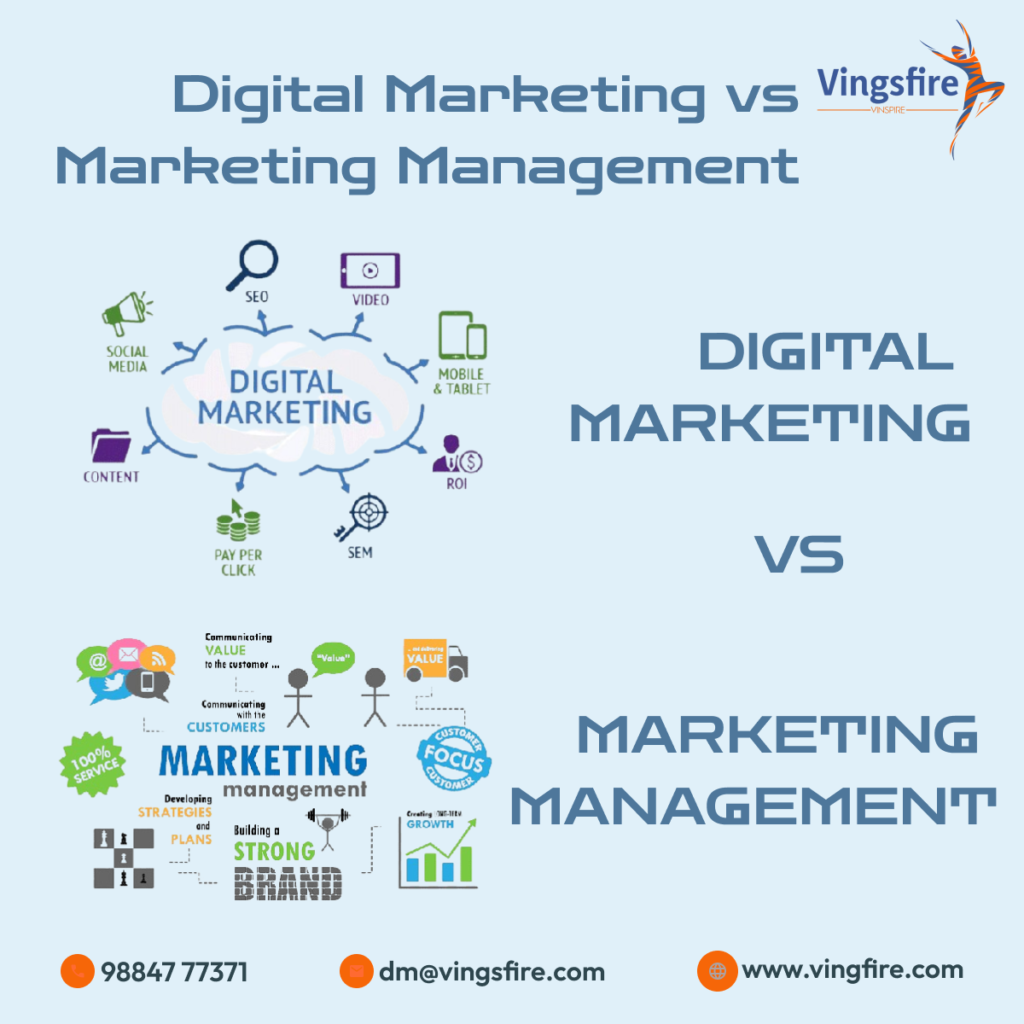
Digital Marketing vs Marketing Management
In the ever-evolving realm of business promotion, the choice between digital marketing and marketing management can significantly impact an organization’s success. Both approaches play crucial roles in reaching and engaging audiences, yet they differ in strategies, channels, and objectives. This blog will explore the distinctions between digital marketing and marketing management, shedding light on their unique attributes and guiding businesses towards making informed decisions.
Digital Marketing: A Technological Frontier
Digital marketing encompasses a spectrum of online channels and tools designed to promote products or services. It leverages the power of the internet to reach a global audience. Strategies often involve social media, search engine optimization (SEO), content marketing, email campaigns, and more. One of the primary advantages of digital marketing lies in its ability to target specific demographics with precision, allowing businesses to tailor their messages to different audience segments.
Key Components of Digital Marketing
Social Media Engagement
In the realm of social media, Facebook, Instagram, and Twitter function as powerful platforms, offering accessible pathways for establishing direct connections with audiences. Through these channels, content creators can cultivate meaningful interactions, encourage audience participation, and foster a vibrant community engagement.
Search Engine Optimization (SEO)
Search Engine Optimization (SEO) involves strategically optimizing online content to attain higher rankings in search engine results, thereby increasing visibility and accessibility. This practice encompasses various techniques aimed at improving website performance and enhancing its discoverability by search engines, ultimately driving organic traffic and improving online presence.
Content Marketing
Content Marketing is a strategic approach to digital marketing that revolves around the creation and distribution of valuable, relevant, and consistent content. The goal is to attract and retain a specific target audience, fostering brand loyalty and driving profitable customer action. This multifaceted practice involves crafting engaging articles, videos, infographics, and other forms of content tailored to meet the needs and interests of the intended audience.
Email Campaigns
Email campaigns leverage the power of electronic mail as a strategic tool for targeted communication and promotional efforts. By delivering tailored messages directly to recipients’ inboxes, businesses can build relationships, share valuable content, and drive engagement with their audience.
Marketing Management
On the other hand, marketing management involves overseeing and orchestrating all marketing activities within an organization. It takes a broader perspective, integrating various components such as market research, product development, branding, and distribution. Marketing managers are responsible for developing comprehensive strategies that align with the organization’s overall goals. While digital marketing is a subset of marketing management, the latter encompasses a more extensive array of activities beyond the digital realm
Key Components of Marketing Management
Market Research
Market research involves the systematic gathering and thorough analysis of data to gain insights into prevailing market trends, consumer behavior, and competitor strategies. This comprehensive approach aids businesses in making informed decisions and developing effective strategies for sustained success.
Product Development
Product development is the iterative process of conceiving, designing, and refining products to align with market demands and consumer preferences. This dynamic approach incorporates ongoing feedback loops, ensuring that the final offerings meet or exceed customer expectations in an ever-evolving market landscape.
Branding and Positioning
Branding and positioning involve the strategic process of not only creating a distinctive brand identity but also strategically situating that identity within the market landscape. This encompasses defining core values, crafting a memorable visual identity, and communicating a compelling narrative to distinguish the brand from competitors.
Distribution Channels
Distribution channels encompass the strategic development and efficient management of various pathways through which products or services reach end consumers. This involves selecting and coordinating distribution partners, optimizing logistics, and ensuring seamless delivery processes to maximize market reach and customer accessibility.
Comparative Analysis
Comparative analysis between digital marketing and marketing management reveals distinctions in focus and methodology. Digital marketing primarily leverages online channels and platforms for promotional activities, emphasizing strategies such as SEO, social media, and email campaigns. It often involves data-driven approaches, targeting specific online audiences.
Target Audience Reach
Digital Marketing
Digital marketing strategically focuses on reaching a defined audience through various online channels, enabling precise demographic targeting. This approach leverages the capabilities of digital platforms to tailor messages, content, and advertising efforts for optimal engagement and conversion within specific demographic segments.
Marketing Management
Marketing management adopts a comprehensive approach, taking into account a diverse audience by implementing a mix of online and offline strategies. This inclusive strategy ensures a broader reach and resonance with varying consumer segments.
Data-Driven Decision Making
Digital Marketing
In the realm of digital marketing, the reliance on data analytics is paramount, enabling the continuous extraction of real-time insights and the implementation of agile adjustments to optimize campaigns, target audiences, and overall strategies.
Marketing Management
Marketing management integrates data into strategic planning, albeit with a potentially less immediate dependence on real-time, data-driven decisions. This broader approach may involve a combination of historical data analysis and ongoing market research for comprehensive decision-making.
Scope of Activities
Digital Marketing
Digital marketing is predominantly centered on leveraging online channels and cutting-edge technologies to reach and engage target audiences. This encompasses various strategies such as social media marketing, content marketing, search engine optimization, and online advertising.
Marketing Management
Marketing management takes a comprehensive approach by encompassing a wide spectrum of marketing activities, including both online and offline strategies. This holistic perspective ensures that businesses effectively reach and engage audiences through diverse channels to achieve overarching marketing objectives.
Conclusion
In conclusion, the debate between digital marketing and marketing management is not about choosing one over the other but understanding how each fits into a comprehensive marketing strategy. Businesses that embrace the strengths of both approaches are better equipped to navigate the dynamic landscape of modern marketing. By recognizing the unique benefits of digital marketing and marketing management, organizations can craft strategies that resonate with their audience and drive sustainable success.

